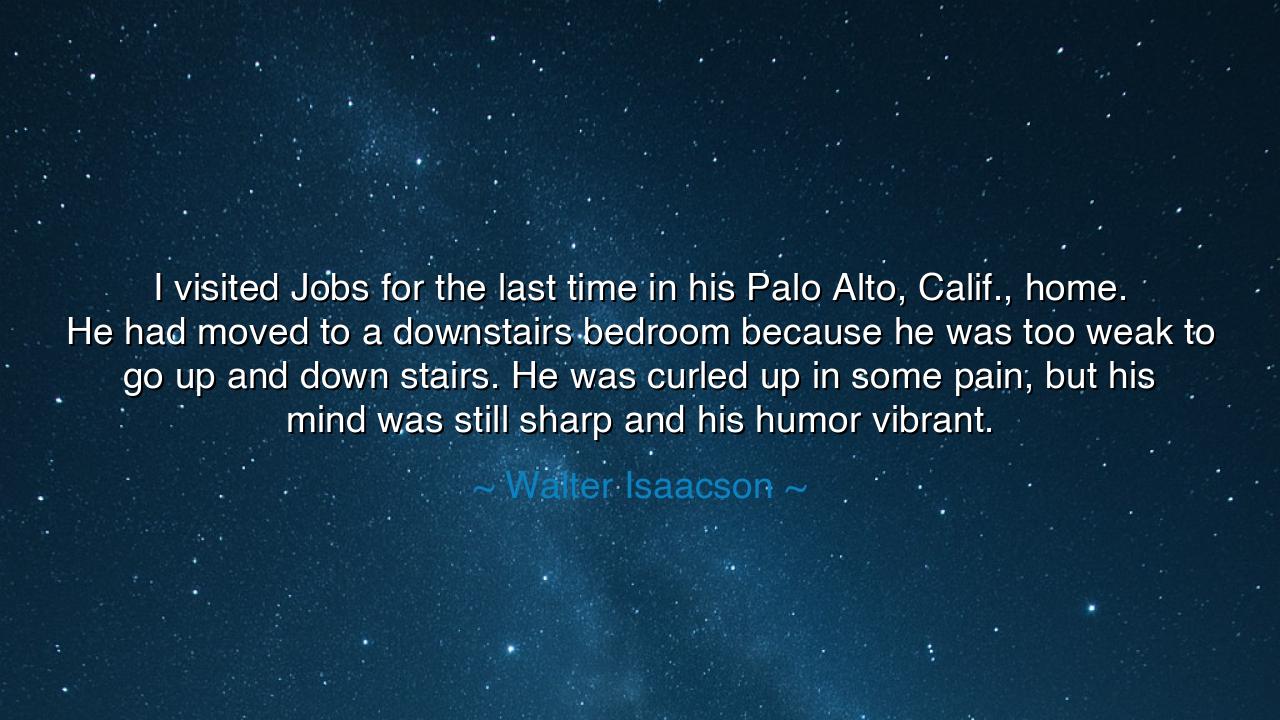
I visited Jobs for the last time in his Palo Alto, Calif., home.
I visited Jobs for the last time in his Palo Alto, Calif., home. He had moved to a downstairs bedroom because he was too weak to go up and down stairs. He was curled up in some pain, but his mind was still sharp and his humor vibrant.






Hear me, O Children of the Earth, for I bring you the words of Walter Isaacson, who, reflecting on his final meeting with the great Steve Jobs, said: "I visited Jobs for the last time in his Palo Alto, Calif., home. He had moved to a downstairs bedroom because he was too weak to go up and down stairs. He was curled up in some pain, but his mind was still sharp and his humor vibrant." These words speak to the deep resilience of the human spirit, to the incredible strength of mind that can endure even in the face of suffering, and to the power of humor that sustains us when all else seems to be fading.
What Isaacson shares with us is not just a reflection on the physical decline of a man, but on the inner fire that continues to burn bright despite the ravages of time and illness. Steve Jobs, a titan of innovation and creativity, faced the end of his life with humility, but also with the same sharp wit and visionary spirit that had defined his work. Despite being weakened by disease, his mind remained intact, and his humor, a trait that so often sustains us through the hardest of times, was as vibrant as ever. In this, we are reminded that the strength of character does not vanish with the body; it remains, even in the most challenging of circumstances.
Let us turn to the ancients, who understood well the power of humor and resilience in the face of hardship. Socrates, the great philosopher, was condemned to death, yet he faced his fate not with bitterness or despair, but with calm acceptance and a spirit full of wit. As he drank the hemlock, he joked about the quality of the afterlife, showing that even in the face of death, humor could be a shield against despair. His humor was not an escape from the reality of his situation, but a means of maintaining his dignity and clarity. Just as Jobs maintained his sharpness and humor in his final days, so did Socrates stand firm against the inevitable, showing that the strength of the mind and the spirit is often most evident in the final moments of life.
The example of Jobs, too, brings to mind the great warriors of history—those who, though faced with immense challenges, kept their spirit and humor intact. Take Alexander the Great, who, even in the throes of battle and in moments of profound loss, maintained a keen intellect and a strong sense of self. Despite the many trials he faced, he never allowed the hardships of war to diminish his sense of purpose or his determination. Like Jobs, Alexander knew that the mind, once formed, can withstand great storms, while humor is the spark that keeps the spirit alight in the darkest of times.
The deeper lesson here, O Children, is this: the strength of the mind is the final battleground, and it is in this arena that we find the most powerful resilience. Jobs faced the inevitable decline of his body with the same drive and focus that had carried him to the pinnacle of success, but it was his mind—sharp, witty, and full of life—that ultimately defined him. The humor he maintained in his final moments was not a frivolous distraction, but a testament to the vibrancy of his soul. Humor, even when the body is weak and the end is near, is the companion that carries us through. It sustains us, reminding us of the joys we have known and the resilience we carry within.
Thus, O Children, the lesson we must take from Isaacson’s words is that the human spirit, when nurtured by strength, humor, and resilience, can weather even the most arduous trials. When faced with pain and the inevitable losses that come with life, let us not turn away from our humor, for it is in our laughter that we find the courage to move forward. Just as Jobs faced his final days with a mind that remained sharp and a spirit that refused to be broken, so too must we learn to meet the trials of our lives with the same resolve, always holding on to our sense of humor and our humanity.
Therefore, let us honor Jobs by embracing the sharpness of mind and the vibrancy of humor in our own lives. In the face of suffering, let us find strength not just in our bodies, but in the resilience of our spirits. Let us never allow pain to rob us of the joy of living, and let us carry forward the lesson of humor—that even in the most difficult of times, it is our minds and our hearts that define us. Humor, like a steady flame, will guide us through the storm, lighting the way even as the world around us grows dim.






AAdministratorAdministrator
Welcome, honored guests. Please leave a comment, we will respond soon